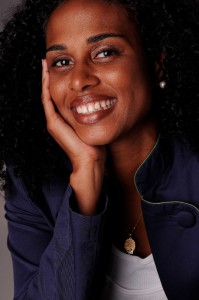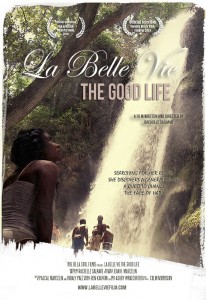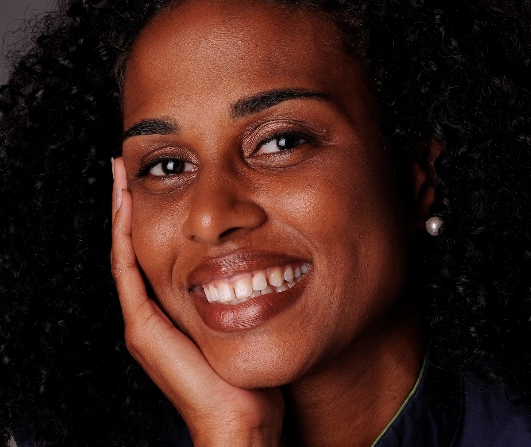 Since a young age, Rachelle Salnave knew she wanted to go into the Entertainment Industry. Growing up watching shows such as “The Bill Cosby Show,” “Fame,” and “The Facts of Life” with strong talented Black characters and with her roots as a first generation Haitian, it only made sense that she would want to follow in their footsteps by creating films that highlighted identity, race and class.
Since a young age, Rachelle Salnave knew she wanted to go into the Entertainment Industry. Growing up watching shows such as “The Bill Cosby Show,” “Fame,” and “The Facts of Life” with strong talented Black characters and with her roots as a first generation Haitian, it only made sense that she would want to follow in their footsteps by creating films that highlighted identity, race and class.
Salnave, who turns 40 this year, is originally from Harlem, New York and her newest documentary, “La Belle Vie: the Good Life” has been accepted at both the Toronto Black Film Festival and the Pan African Film Festival. She attended Hunter New York Film Academy for her undergrad and then received her Master’s in Film at the University of Miami.
The documentary surrounds her discovering Haiti and what La Belle Vie really meant to the people of Haiti and her family. The term, La Belle Vie was inspired by her parents.
“Growing up as a kid, we lived very modestly, but my parents, specifically my mom, always talked about La Belle Vie, this beautiful life, that not only did she live but really her mother lived. And she would show me these beautiful albums of pictures from the 1940s and 50s of my grandparents traveling in Europe and really living this beautiful life,” Salnave said.
However, the term became more than that to her. To her parents and grandparents, it was living this luxurious life in the city, but for Salnave, the term became more about the whole country and the people residing in Haiti.
“I started doing some research and I went to Haiti, and I actually found a completely different side of Haiti, which is the beauty of the people who just like myself have really been trying to change the face of Haiti by doing what they love to do,” Salnave added.
Her goal with the documentary was to show this side to people who had never seen or thought about Haiti in this way. To many people, Haiti is seen as a poverty-stricken island, but it is much more than what the media presents, and she wanted her audience to know it is this beautiful place with beautiful people. At the time of the filming and start of production, the earthquake had just hit. At first, Salnave was uncertain about whether or not a film focusing on good, prosperous parts of Haiti was a good idea for the time. Nevertheless, after much thought, she realized there was no better time to show the beauty of the country and the people after such a disastrous event. And it was the best time since the earthquake brought out a whole new side to the people of Haiti.
“For me, the beauty was not only finding a movement of this Diaspora that awakened after the earthquake of people seeking their roots and really promoting Haiti in a positive way, but even going to Haiti and meeting people who really separately want to change Haiti,” Salnave said.
This was a nice change to what she had experienced growing up in Harlem. People were finally being proud of their roots to Haiti.
When stating one of the reasons she decided to create the documentary, Salnave said,
“I lived in an environment where Haitians were disrespected, where it was almost like you were as a kid afraid to say you were Haitian because you didn’t want to get teased and tormented by people who thought Haitians were the ugliest things on Earth and carried the HIV virus.”
However, now Haitians, specifically American Haitians, were proud to acknowledge their roots, and they now were yearning to know more about their country and the beauties of it.
“La Belle Vie: the Good Life” is not Salnave’s first experience with film. It is actually her second documentary. Her first one was based in Harlem called “Harlem’s Mart 125: the American Dream.” This piece looked through the Harlem lens and compared big businesses to small businesses and showed the struggle for Black Americans.
 “Harlem’s Mart 125: the American Dream” really helped her with her second documentary because it allowed her to understand the industry. However, the struggle is always there.
“Harlem’s Mart 125: the American Dream” really helped her with her second documentary because it allowed her to understand the industry. However, the struggle is always there.
“It’s always a challenge when you’re an independent film maker. It doesn’t matter what gender you are or what skin color you are. Not having a lot of backing is always a challenge,” said Salnave.
With that said, her funding was a little easier for this documentary due to Kickstarter. Kickstarter is an online platform where anyone can raise money for a project, trip, charity, etc. The person raising the money sets a goal for how much they want to raise and then, the platform is sent out to anyone that they want to. Anyone can donate and the person gets to choose how much they donate. However, the only way to get the money is if they reach their end goal. If it is not met, the money is returned. It is all or nothing crowdfunding.
Luckily, Salnave and her team were able to raise enough money to fund their project. Her team was very small. For the most part during production, it just consisted of her and her cinematographer, Jean H. Martelin, with one or two extra sound or camera people coming in for a scene or two. Her post-production team consisted of two editors, a graphic designer, and one sound person.
One of the big differences with filming this piece compared to her other documentary was that she was in it.
“It is very difficult to direct yourself and to be in your own film, and to edit yourself and to critique yourself because pretty much. I am the character, so when I talk about the film, I am talking about a character and that character is me,” Salnave said.
Though this took some time getting used to, she eventually got a handle of it during production.
Her film will be premiering at two festivals this year. One is the Toronto Black Film Festival, which was founded in 2013 and it takes place Feb. 10-15.
“The Toronto Black Film Festival (TBFF) is all about Diversity and Discovery. TBFF wants to showcase stories that educate, inspire, shock and entertain. We are happy to show a different side of Haiti through Salnave’s intmate documentary. She uses her own family stories and personal journey to tell a much bigger story; one that is not often seen on screen. Her film will resonate with many people from different backgrounds,” said TBFF Founder and President Fabienne Colas.
The other festival La Belle Vie will be viewed at is the Pan African Film Festival, which takes place Feb. 5-16.
When talking about her goal for the festivals, Salnave stated, “With any film, we want to get it picked up. We want to get it distributed. We’re hoping that some buyers actually attend the screening and we get a lot of promotion. We just hope the festival will get the buzz going and the film will get the distribution it deserves.”
Salnave hopes that audiences will appreciate her film. It has been a long project for her.
“This is a very personal story, but many people will relate to it, especially if you come from an immigrant background and you’re first, second generation American and I really want people to see a different side of Haiti that is not really shown or given a chance in the media,” Salnave added.
For more information on Salnave’s documentary, you can visit her website at www.labelleviefilm.com and you can find more information on the festivals at www.paff.org and torontoblackfilm.com.
 Kaylene Hersey is an intern at Lioness and is currently a senior creative writing major at Western New England University. She is from Colchester, Conn. Besides writing, she has a passion for baking and dancing, and she hopes one day to work in the Editing and Publishing world. If that fails, she plans to open up her own bakery.
Kaylene Hersey is an intern at Lioness and is currently a senior creative writing major at Western New England University. She is from Colchester, Conn. Besides writing, she has a passion for baking and dancing, and she hopes one day to work in the Editing and Publishing world. If that fails, she plans to open up her own bakery.






Add Comment